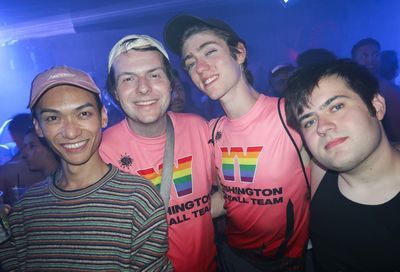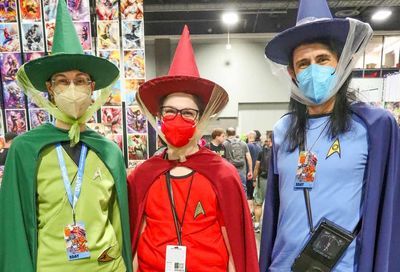Next Generation Awards 2010
By the time she was 10, Amy Loudermilk knew that phoning her best friend and getting a busy signal meant one thing: danger.
”Her parents were involved in a domestic-violence situation,” Loudermilk says, ”and her father, the abuser, had a habit of unplugging all of the phones whenever something bad was going on.”
 Amy Loudermilk
Amy Loudermilk
Loudermilk would keep calling until she got through.
One day in the sixth grade when she didn’t get through, the Gaithersburg resident made the 10-minute walk to her friend’s house to help.
”I walked in the house,” Loudermilk recalls. “It was during the afternoon. All of the lights were out and her father was sitting at the kitchen table with his gun.”
Somehow Loudermilk was able to walk upstairs and escort her friend back to her own home without attracting the father’s attention.
Those childhood encounters dealing with domestic violence set Loudermilk on a path that would lead her to the Rainbow Response Coalition, where since 2008 she has been volunteering as co-chair. The coalition is made up of organizations, leaders, government agencies and domestic-violence service providers, collaborating to raise awareness about intimate-partner violence (IPV) in the relationships of LGBT people in D.C.
”Just seeing the realities of [my friend’s] life, and trying to help her…affected me a lot, but at the time I still didn’t think that’s what I wanted to dedicate my life to.”
Loudermilk also works full time as senior policy specialist among a team of nine at the DC Coalition Against Domestic Violence, from the group’s office inside the National City Christian Church at Thomas Circle. The coalition advocates for local legislation in front of the D.C. City Council, as well as for funds for domestic-violence service providers in the city.
”We also do system-reform work,” Loudermilk adds, ”which is where a lot of my work on LGBTQ [issues] comes in: How can you make the system, as a whole, better and responsive for survivors? I get to do a little bit of work on LGBTQ domestic-violence issues, but obviously not as much as I would love to. That’s why I do it outside of my normal work hours as well.”
It wasn’t until Loudermilk worked part time at the House of Ruth, a shelter for domestic-violence victims in D.C. that she found her calling.
”I always knew that I wanted to do political work and some sort of work to change the realities of society,” she says. ”There were a number of issues that I was really passionate about — and I’m still passionate about — so I had no idea how I was going to narrow it down to one issue.”
Working at the shelter helped. She couldn’t help but ponder what domestic-violence services looked like for LGBT people in the District.
”I started to think, ‘Are there service agencies? Are there specialized services? Service providers? Where do they go?’ And then just beginning to do a little bit of research into that really sparked my interest.”
In addition to taking on those questions, Loudermilk’s work with the Rainbow Response Coalition in D.C. has included efforts to train the Metropolitan Police Department’s officers about IPV issues among LGBT people.
”We have made really fantastic inroads with the MPD,” Loudermilk says. ”We’ve really strengthened our relationship recently, so I’m hoping to do — in addition to more training — more standardized information and data collection, because there actually aren’t very many police departments across the country that track incidences of LGBTQ domestic violence.
”That’s really problematic in the grant world, because you can’t show that there are the appropriate numbers of victims to justify a grant request. It’s hard to know if you’re responding to the need, and what are the trends, without data. That’s one of my top priorities: just to begin to even get a sense of what are the numbers in D.C.”
Of her recognition as a Next Generation Award winner, Loudermilk says, ”I had never gotten an award like this before. It’s my first one. I was very excited, but felt maybe not as deserving as some other people might be.”
While she works in D.C. and is fond of the city, Loudermilk refuses to live in the District until voting representation is granted to its citizens.
She currently resides in Gaithersburg with her two cats.
”I don’t have a lot of downtime because I’m one of those people that is so passionate about this that pretty much if I have a free minute I want to be doing something to further this along. Also, doing this work, it’s really difficult work. It’s tough work and it’s very emotional, so you do have to put limits on it and take breaks sometimes.”
For Loudermilk that means spending a quiet evening at home, reading.
”All of the other people who I know who do this work, the kind of stuff that they read is fluffy beach novels and romance,” says Loudermilk. “But I’ll go and grab a true-crime book. People will just think I’m nuts — but that’s what I do.”






















